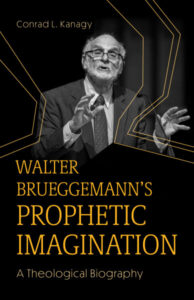Walter in his Writing Hideaway
Here’s an excerpt from Conrad L. Kanagy’s upcoming biography entitled Walter Brueggemann’s Prophetic Imagination: A Theological Biography.
Preorder here:
Subscribe to get notified as additional excerpts are posted.
He was anxious. It was two o’clock in the afternoon. By now, this was supposed to be his time—two to five o’clock. Everybody in the office knew the drill. But the questions kept coming. Next weekend’s board meeting agenda? The new hire who needed to be oriented? The never-ending enrollment concerns? The UCC denominational executives arriving tomorrow? Walter wondered why so much got pushed down to his office. The short answer? Everyone knew that whatever ended up on the dean’s desk always got done—typically before it was due. Amid all the questions, he responded graciously to the secretary, who appeared beleaguered by the assault on his time. He knew none of this was her fault.
Suddenly he left the office. What remained undone would remain for tomorrow. The thing that couldn’t remain another moment was his writing. The seminary would survive without him in that office one more minute. But he wasn’t sure he would survive if he stayed. Soon his energy returned. The change in his pace reflected the change in his mood. He bounded up the stairs of the dining hall to the building’s second floor. His anxiety began to wane as he turned the key. Opening the door to the tiny hideaway office that few knew about, he went immediately to his desk. Finally, finally, those coveted and uncoerced moments of emancipation! The moments he lived for. Serving as dean was just the price he paid for this time. Commitment to Eden Seminary, the only seminary of his childhood faith tradition, was a cost he was willing to pay. After all, they had generously and patiently seen that his struggling father got through decades before.
The hideaway was his haven, maybe even a bit of heaven. If Jesus needed to get away for God’s sake, the Almighty understood that the dean of a seminary did too, especially when so much of the work didn’t seem that much about Jesus. While some faculty used their hideaway offices to nap between classes, Walter used his to finally awaken. They were restored by sleeping—he by writing. He had little time for sleep at all, let alone in the middle of the afternoon when he could be at his desk. Alone. Gloriously alone, except for his library and the biblical text. Oh yes, and that free God of the text. A monk, the students called him. He received that as a compliment.
He began to write even before removing his coat. He wrote long-hand, always his preference—pen to paper. And as on most days, he knew exactly where to begin. Throughout the day he had mentally mapped out his work for the afternoon. He often escaped into his writing, even if only in his head and not in his hideaway. He had the remarkable capacity to unplug from whatever else he was doing to plug back into his writing. His capacity to do so was growing by the day. Isolated from others, he could focus on the subject matter at hand. Some days he would break for a short game of basketball with the male students who loved when he joined them. The problem was that he was as fierce and determined on the hardwood as he was at the blackboard. And in both contexts, he was determined to win at all costs. More than one student had paid the price for getting in his way. But no basketball today—he had gotten to the hideaway late.
Walter was among friends in the hideaway, with his library around him and the books needed for that afternoon’s work spread out on his desk: the biblical text first and foremost, Norman Gottwald, Peter Berger, Gerhard von Rad, José Miranda, Abraham Heschel, Robert Friedrichs, and a host of commentaries. Still, he knew his most extensive library was in his head— always had been. Walter read more books in a week than most faculty did in a month. He also read across disciplines, always curious about what those in other fields were saying, and always read one or more national newspapers daily. On a good day, he produced the equivalent of twelve pages, typed double-space in two or three hours. He had many good days. The next morning he dictated the written work and handed it to his secretary. She deciphered between the handwriting and dictation and delivered it back to him as cleanly typed text that he rarely edited. He figured that he usually got it right the first time.

0 Comments